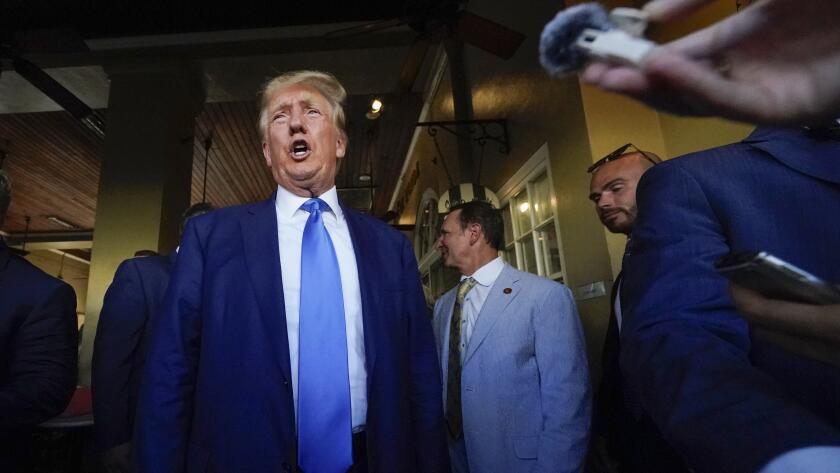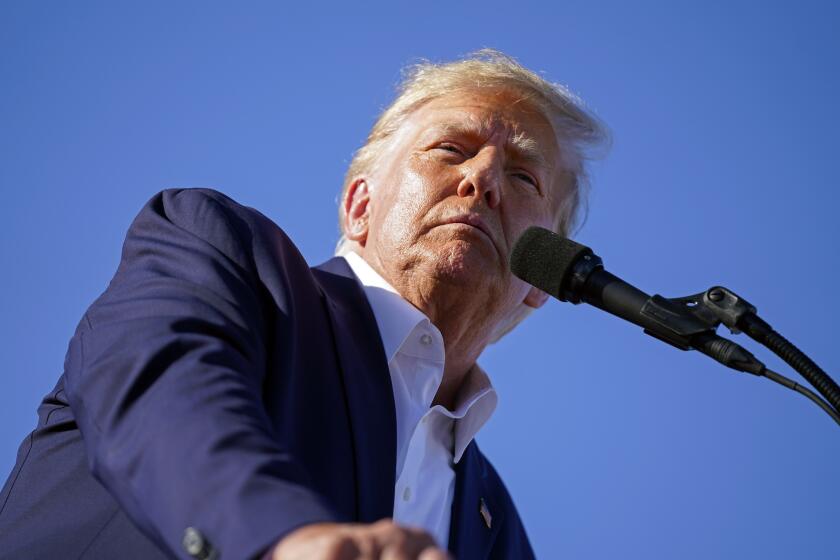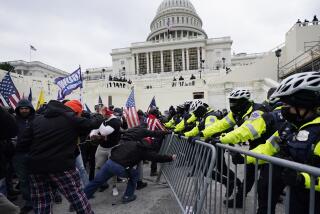Trump indicted over efforts to overturn the 2020 election
- Share via
The indictment alleges that Trump sought to discount legitimate votes and subvert the 2020 presidential election results.
- Share via
WASHINGTON — Former President Trump was indicted Tuesday on four felony counts following a special counsel investigation into efforts to stop the transfer of power after his 2020 election loss and his role in the Jan. 6, 2021, insurrection.
Trump is charged with conspiracy to defraud the United States, conspiracy to obstruct an official proceeding, conspiracy against rights, and obstruction of or attempting to obstruct an official proceeding.
The indictment alleges that Trump sought to discount legitimate votes and subvert the 2020 presidential election results through three criminal conspiracies: obstructing the nation’s process of collecting, counting and certifying the results of the presidential election; impeding the Jan. 6, 2021, count and certification of the presidential election results; and denying the right to vote and to have that vote counted.
Trump said last month that he had been notified he was the target of special counsel Jack Smith’s probe, which began late last year after televised hearings conducted by a congressional select committee investigating the Jan. 6 attack on the Capitol. Those proceedings laid out many of the overarching facts outlined Tuesday in the criminal charges against Trump. But the 45-page indictment cast in stark relief the allegations that a former president misled the nation, attacked the underpinnings of democracy and enabled violence in an effort to overturn an election and stay in power.
“The attack on our nation’s Capitol on Jan. 6, 2021, was an unprecedented assault on the seat of American democracy,” Smith said at a news conference Tuesday. “As described in the indictment, it was fueled by lies. Lies by the defendant targeted at obstructing a bedrock function of the U.S. government, the nation’s process of collecting, counting and certifying the results of the presidential election.”
Trump has been summoned to appear at 4 p.m. Thursday before Magistrate Judge Moxila A. Upadhyaya at the E. Barrett Prettyman Courthouse in Washington. Though only Trump was charged Tuesday, the indictment refers to six unnamed co-conspirators. Smith said Tuesday that his team’s “investigation of other individuals continues.”
The case has been assigned to U.S. District Judge Tanya S. Chutkan, an appointee of former President Obama and the only federal judge on the bench in Washington who has handed down sentences to Jan. 6 defendants that are longer than those requested by the government.
The indictment is the result of a lengthy, wide ranging probe by Smith that scrutinized Trump’s attempts to mislead the public with claims that the election had been stolen, despite his private acknowledgment that he had lost.
“Each of these conspiracies — which built on the widespread mistrust the Defendant was creating through pervasive and destabilizing lies about election fraud — targeted a bedrock function of the United States federal government: the nation’s process of collecting, counting, and certifying the results of the presidential election,” the indictment states.
For months, federal grand jurors have heard testimony from dozens of witnesses, including Trump’s former attorney Rudolph W. Giuliani and former Chief of Staff Mark Meadows. Governors and local elections officials in battleground states including Arizona, Georgia, Michigan and Wisconsin have spoken with investigators as part of the probe.
The indictment states that, on the pretext of baseless fraud claims, Trump pushed state officials to disenfranchise voters, ignore the popular vote and dismiss legitimate electors in order to have illegitimate electoral votes cast for him. It also states that he and his co-conspirators organized false slates of electors in seven key states — Arizona, Georgia, Michigan, Nevada, New Mexico, Pennsylvania and Wisconsin — to cast votes and send them to Congress to be counted on Jan. 6, 2021.
Read the indictment: United States of America v. Donald J. Trump
The former president is also accused of trying to use the Justice Department to conduct sham election fraud investigations, and to provide support for the fraudulent elector plan and for state legislatures overturning the election results in Trump’s favor.
The indictment states that Trump moved on Jan. 3, 2021, to install a supporter — named “Co-Conspirator #4” in the document — as acting attorney general to issue a letter to certain states saying that the Justice Department encouraged them to convene their legislatures to overturn election results.
That day, Deputy White House Counsel Pat Philbin told the unnamed co-conspirator — who is thought to be then-Assistant Atty. Gen. Jeffrey Clark — that any effort by Trump to remain in power past Jan. 20, 2021, as outlined in the Constitution, would cause “riots in every major city.”
According to the indictment, the co-conspirator replied, “That’s why there’s an Insurrection Act.”
When that plan didn’t work, the indictment states, Trump and his co-conspirators put pressure on then-Vice President Mike Pence and falsely informed him that he could interfere with the counting of electoral votes and certification of results by Congress on Jan. 6.
The indictment states that Pence took handwritten notes about the relentless needling, including that Trump told him “you’re too honest” when he objected to blocking Democrat Joe Biden’s win.
“On January 6th, Former President Trump demanded that I choose between him and the Constitution. I chose the Constitution and I always will,” Pence said in a statement Tuesday.
Trump amassed a crowd in Washington to put pressure on Pence and federal lawmakers to throw out certain state results in order to keep him in power, the indictment alleges.
When the crowd became violent and rioted at the Capitol, and even as they were cleared from the grounds hours later, “the Defendant and co-conspirators exploited the disruption by redoubling efforts to levy false claims of election fraud and convince members of Congress to further delay the certification based on those claims,” the indictment states.
According to the indictment, Trump made calls to two senators at 6 p.m. while lawmakers were still locked in safe rooms and police fought to regain control of the area.
Trump is being charged under a civil rights law first written to prosecute Ku Klux Klan violence during Reconstruction. Sean Morales-Doyle, director of the Brennan Center’s voting rights program, said the statute makes it a crime for two or more people to conspire to interfere with another person’s federal rights.
“It is a statute that has historically been used, and was passed originally, with the intent of prohibiting people from engaging in efforts to interfere with people exercising the right to vote and to interfere in elections,” he said.
As with past charges, the Trump campaign criticized the latest indictment by accusing President Biden of using the Justice Department to derail his presidential campaign.
“This is nothing more than the latest corrupt chapter in the continued pathetic attempt by the Biden Crime Family and their weaponized Department of Justice to interfere with the 2024 Presidential Election, in which President Trump is the undisputed frontrunner, and leading by substantial margins,” the Trump campaign said in a statement. The statement also compared the U.S. justice system to Nazi Germany.
Atty. Gen. Merrick Garland appointed Smith in November to oversee the investigation into Trump’s efforts to stay in power as well as a second probe focused on the mishandling of classified records at the former president’s Mar-a-Lago estate in Florida. The FBI recovered the records during an August search of Mar-a-Lago after a months-long effort to get the former president to turn them over and after receiving evidence showing he had not complied with a subpoena ordering him to return the documents.
Trump was indicted by a federal grand jury in that case in June and charged with 37 criminal counts covering seven different violations of federal law, including the Espionage Act. He has pleaded not guilty to the charges, which include willful retention of national defense information and obstruction of the investigation. A superseding indictment with additional charges was filed last week, bringing the total number of charges Trump faces in that case to 40.
It may be unprecedented in the U.S. to prosecute a former president, but not in other democracies around the world.
Trump is also facing legal challenges at the state level. In Fulton County, Ga., investigators have examined his efforts to pressure state election officials to “find” the votes needed for him to win the key state in the 2020 election. Fulton County Dist. Atty. Fani Willis in Atlanta has said an indictment decision will be made by Sept. 1.
In April, Trump was indicted in New York City on charges related to an alleged hush-money payment made to porn actor Stormy Daniels in the final days of the 2016 campaign. That trial is scheduled to take place in the spring.
A special counsel was appointed in large part because Trump had announced plans to run for president again.
Recent polls show Trump with a substantial lead over his challengers for the GOP presidential nomination and also competitive with Biden in a general election matchup. His previous two indictments seem to have only bolstered his standing among Republican voters.
They have also been fundraising boons for his campaign.
Within minutes of the third indictment landing, Trump’s campaign sent a fundraising email: “Please make a contribution to show that you will NEVER SURRENDER our country to tyranny as the Deep State thugs try to JAIL me for life – for 1,500% impact.”
Times staff writer Arit John contributed to this report.
More to Read
Get the L.A. Times Politics newsletter
Deeply reported insights into legislation, politics and policy from Sacramento, Washington and beyond. In your inbox twice per week.
You may occasionally receive promotional content from the Los Angeles Times.













